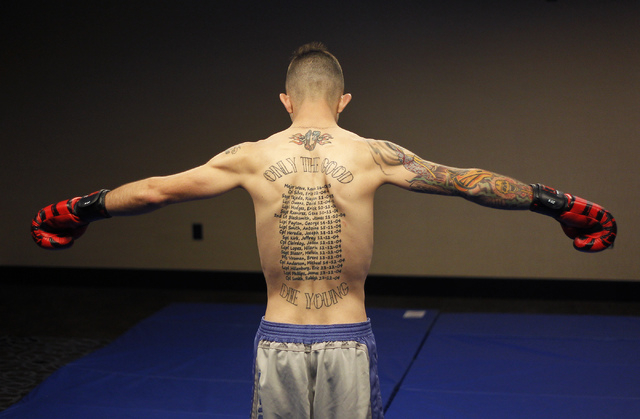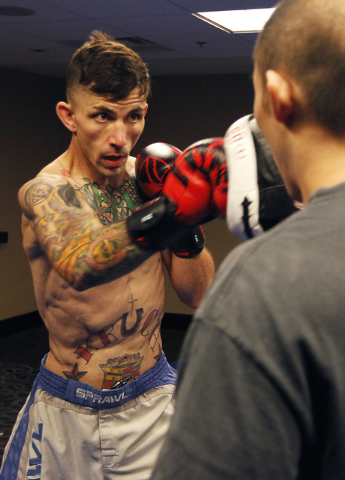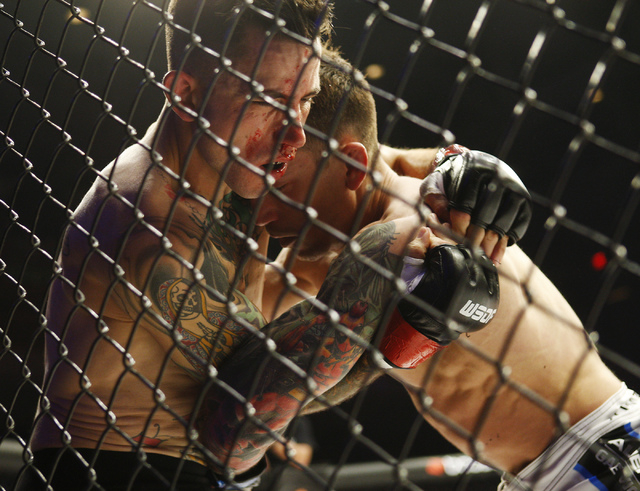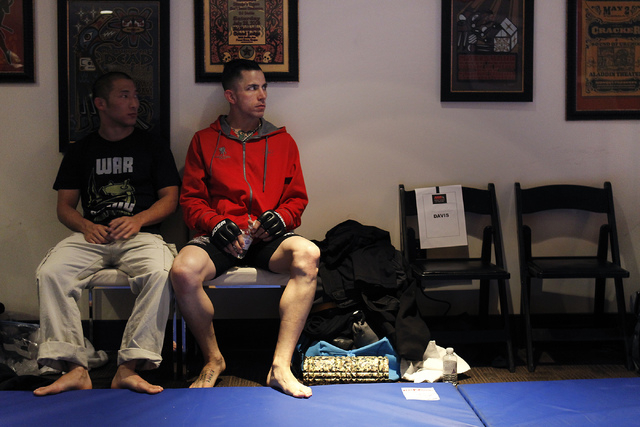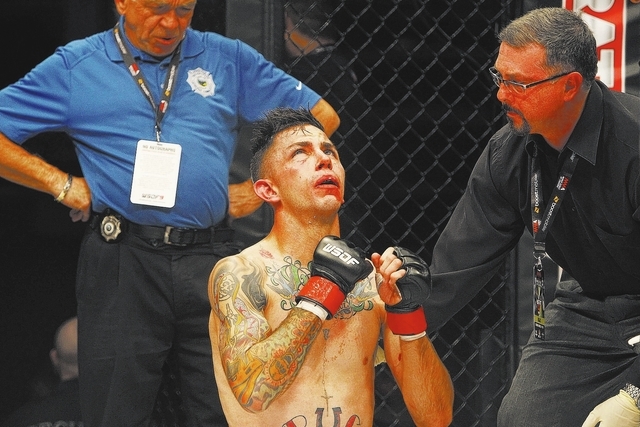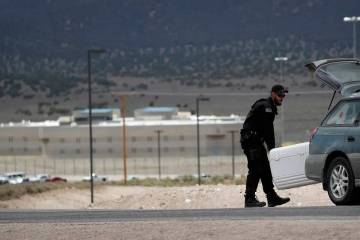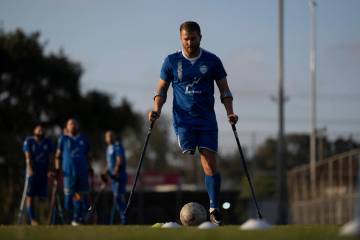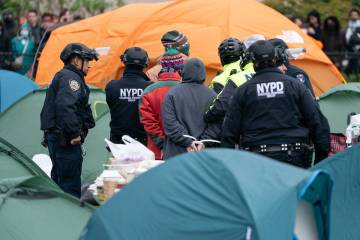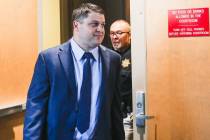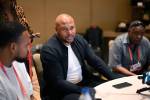Fallen comrades, mixed-martial arts help Marine beat PTSD
Shane Kruchten was down on the mat Saturday night but not out of his fight for life.
With a bloodstained mouth and his right eye almost swollen shut, the Iraq War Marine veteran with the names of 19 of his fallen comrades tattooed on his back pointed his fingers skyward as if to let them know he will never give up though he had lost this bout.
When it was over at 2 minutes and 59 seconds into the second round of his World Series of Fighting featherweight fight at the Hard Rock Hotel, and the referee raised the arm of his Marine veteran opponent, Mike Corey, in victory, it was clear that the 29-year-old Kruchten was brokenhearted.
But with the support of his father and stepmother in the stands, the ever-faithful backing of his wife, Krystine, his friends back in Oshkosh, Wis., and of course, the wounded warriors cheering from his corner, this man who beat his suicidal battle with post-traumatic stress disorder would get up Sunday and today and the next day and beat it again.
That’s what disciplined, mixed martial artists do, especially those like Kruchten. He carries the weight of war stress on his back where the names of his fallen brothers stand out in blue ink, from “Maj. Wave, Kevin 26-03-03” to “Capt. Smith, Raleigh, 23-12-04.”
“Only The Good Die Young,” reads the tattoo that surrounds the list.
“They are always going to be behind me, pushing me. And at the same time, it gives me a secondary drive in life to always push forward because anytime I’m tired, anytime I’m hungry or I’m cutting weight for a fight or I’m in a fight and maybe it’s not going my way … I just think my brothers on my back would be kicking me right in the face if they could be here, yelling at me, telling me to drive forward,” he said on Thursday after a workout when he weighed 153 pounds and was trying to get down to 144.
“In the Marine Corps, it’s ‘Semper Fi,’ which is ‘always faithful,’ ” Kruchten said. “And I will always be faithful to my brothers. I want to give them a reason to look down and give that proverbial thumbs-up.”
After the loss, and before he was taken to University Medical Center, he embraced his father, Willie, and stepmother, Joan Kruchten.
“He said he was sorry he let people down,” his dad said. “I told him, ‘You did your best, and that’s all you can do and we love you very much.’ He’s got a big heart and lived a rough life, but he’s always been good.”
The “rough life” came during and after his tour with Kilo Company of the 3rd Battalion, 5th Marines in 2003, 50 miles southwest of Baghdad. That’s where roadside bombs and other types of improvised explosive devices were taking their toll on U.S. troops.
“Most people only lose their loved ones and maybe a friend or two in their whole life. You know before I was 21 I had lost 19 within a two-year gap,” he said.
One thing led to another. Suddenly this teenager who had been enamored with patriotism as a kid after the Gulf War watching tanks in parades roll down Main Street, survived firefights and seen his share of death was medically discharged in 2005 because of problems with PTSD.
“When I came back from Iraq, something wasn’t right. Something wasn’t clicking. I went and asked for help,” he recalled. “They asked me what was going on and I told them I’m drinking heavily, I’m not sleeping. I’m depressed. The word depressed came out of my mouth.
“My life changed 180 degrees in 24 hours. I had letters from division psychologists saying I wasn’t allowed to go near the armory. I could not handle my weapon. I could not leave my barracks. … I was a prisoner in my own world. These guys that I would lay down the world for are stripping me of everything I earned.
“I was lost in the sauce,” he said.
He was “kicked out” of the Marine Corps “for a thing called personality disorder, which is bipolar. There ended up being 46,000 other Marines from 2004 to 2006 who were kicked out for personality disorder.”
So he checked in with the Department of Veterans Affairs.
“They rushed me off to a psychologist. I’ve never had more pills given to me. Kind of, ‘Here take this, this, this, this, this.’ I didn’t feel as if I was getting help. I was just getting medicated and making me into a zombie. That was kind of my downfall. My beginning of my downfall,” the 6-foot-1-inch veteran said.
He said the pills made him “zombieish” and made him retain water. “That’s not my kind of way. I’m not a left-foot-in-front-of-the-right-foot kind of guy. I like to hop and skip and run if I need to.”
Then the heavy-weight Kruchten — he weighed 262 pounds in 2006 — ballooned up. “I was eating fast food. And I was doing a bunch of unhealthy behaviors,” he said.
In retrospect, though, “I don’t want to put this all on the VA because it’s not the VA’s fault. They were doing their job, and I applaud the VA for all the amazing things they been doing and have done for the veterans. Because without the VA, most of us would be flat on our face homeless, unfortunately. So the VA has done nothing but the right things.
“It’s what the veteran does. What I was doing was abusing my health,” he said.
That abuse bottomed out in June 2009.
“I was gaining this weight. I was like, ‘It’s OK. I can go eat this 5,000-calorie, huge greasy box of cheese nuggets at 3 in the morning, after drinking heavily at the bar all night and pass out.”
On June 14, 2009, he tried to take his life, thinking, “I’m nothing but wasted space and I’m making people depressed. Screw it. It’s time to run the wheels off this bad boy. I had no faith left in humanity and no faith left in myself.”
So after snorting and ingesting cocaine, drinking a bottle of Jack Daniels and swallowing lots of pills — “I didn’t know what the pills were” — he passed out only to awake a few days later in his own vomit and waste to the knock of a police officer pounding on his door.
“That was quite a wake-up call,” he said.
He credits his corner man, Nobie Lara, a veteran with the Wounded Warrior Project, who got him back into shape, got him focused on training, eating organic food and pursuing mixed martial arts.
“He saved my life,” said Kruchten, who runs five to seven miles every morning before he goes to work as a construction safety director and quality control manager in the San Diego area.
Still, he said, “every day in my life is like a roller coaster. I always hope to be at the tallest part, but sometimes I’m on that old rickety roller coaster. That’s the wooden one that’s real sketchy, and I’m flying towards the bottom. Sometimes I’m at the highest of the high, and sometimes I’m at the lowest of the low.”
His best advice “to anybody who has suicidal thoughts is make sure you reach your hand out. There is somebody that will listen. Nobody is against you. And people aren’t going to judge you.
“Just reach out. I didn’t reach out until it was almost too late, and by the grace of God I’m still here and I’m able to empower others.”
Contact Keith Rogers at krogers@reviewjournal.com or 702-383-0308. Find him on Twitter: @KeithRogers2.



